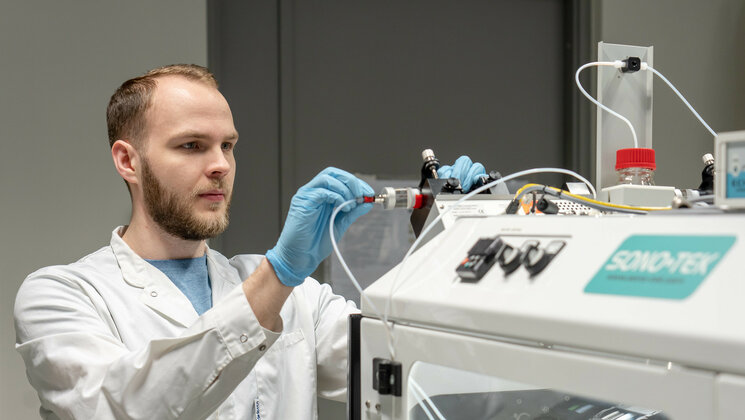The Just Transition Consortium supports both technological and societal transition in Ida-Viru County

On 16 October, the first cooperation seminar of Tallinn University of Technology and the University of Tartu’s consortium of the Just Transition Fund was held at the Virumaa College of the Tallinn University of Technology. The event brought together 22 research teams whose work will help develop technologies and monitor societal transition in the Ida-Viru region over the next six years.
The consortium’s research areas are related to four major thematic fields: the transition to renewable energy and distributed energy solutions, the digitalisation of industry and the use of big data, critical raw materials and valorisation by chemical processes and the monitoring of societal transition processes and the analysis of governance models in the Ida-Viru region.

In her opening speech at the seminar, Mare Roosileht, Director of the Virumaa College of Tallinn University of Technology (TalTech) and head of the Just Transition Fund (JTF) consortium, emphasised the importance of cooperation between the two universities for Ida-Viru County. With the support of the areas of research, the consortium will help companies in Ida-Viru County to find new research-intensive technologies that will make it possible to establish a cleaner industry and create new, valuable jobs, thus fostering societal change.
Renewable energy and distributed solutions
The energy sector is one of the pillars of the economy in Ida-Viru County. The aim of this research area is to provide knowledge to companies in Ida-Viru County and help develop solutions to foster the consumption of locally produced renewable energy and promote community energy.
Two projects at the University of Tartu (UT) and four at TalTech are connected to the research area of renewable energy and distributed solutions. Jaak Nerut and Gunnar Nurk, Associate Professors of Physical and Electrochemistry at the UT, are working on electrolysers and hydrogen storage technologies and researching and developing ammonia synthesis reactors. Taltech’s Tenured Associate Professor Argo Rosin leads a project dealing with renewable energy generation and flexibility technologies, and Senior Researcher Tarmo Korõtko manages a project that involves research on and development of small-scale and community energy solutions. Veroonika Shirokova, Senior Lecturer of Mechanical Engineering and Energy Technology Processes Control at TalTech, conducts research on nanocomposite materials for renewable energy and storage technology.
Digitalisation of industry and big data
A considerable part of the industrial enterprises in Ida-Viru County are poorly digitised, which inevitably leads to lower labour productivity in comparison to competitors. The aim of the research area is to develop technologies to support the use of digital solutions, big data and machine learning in business, to make more complex products and to foster human-robot collaboration.
In the field of developing digital solutions for industry, the University of Tartu leads the research direction of big data and machine learning applications, and develops the direction of data acquisition and analysis of manufacturing companies and other organisations.
The researchers of TalTech are working on four projects in this thematic block. Senior Researcher Vladimir Kuts’ project focuses on process-adaptive robotic platforms. Senior Lecturer Olga Dunajeva deals with the possibilities for the development of robot-human co-creation in industry. Tenured Full Professor Tauno Otto manages the project on developing complex productisation, while Senior Researcher Alar Kuusik deals with artificial intelligence, edge computing and Internet of Things solutions in distributed systems.
Critical raw materials and valorisation by chemical processes
One of the most important trends in the development of the circular economy in Ida-Viru County is the use of materials deposited in the environment. Seven projects involve research on chemical processes related to the valorisation of mineral waste and the extraction and precipitation of rare earth elements. Four of these are led by UT researchers: Professor of Physical Chemistry Enn Lust, Researcher of Physical Chemistry Ove Oll, Professor of Geology and Mineralogy Kalle Kirsimäe and Researcher of Geology Riho Mõtlep.
TalTech’s researchers are working on three projects in this thematic block. Tenured Associate Professor Riina Aav is exploring the possibilities for the extraction of rare earth elements. Olga Pihl, head of the laboratory of the Oil Shale Competence Centre at Virumaa College, is working on the development of a chemical recycling process for waste unsuitable for mechanical recycling. The project led by Tenured Assistant Professor Allan Niidu, head of the Applied Chemistry Research Group at Virumaa College, focuses on the prospects for the circular valorisation of non-fossil CO2.
Monitoring of transition processes and analysis of governance models
Previous studies have shown that in pursuing the goals of the European Green Deal, there is a high potential for increasing socio-economic inequality in Ida-Viru County, where the current population and business structure has been predominantly shaped by the oil shale industry and industry with a high environmental footprint. In the process of the just transition, it is important to transform the economy of Ida-Viru County to achieve sustainability and to find a new development path instead of the old one.
For this purpose, however, both national and local policymakers require information that can help prevent and mitigate the socio-economic inequality associated with the transition and empower business in the region. These issues are addressed in the research area concerning the monitoring of transition processes and the analysis of governance models.
UT is in charge of three projects in this block. Hans Orru, Professor of Environmental Health, assesses the health impact related to the just transition. Kadri Ukrainski, Professor of Research and Innovation Policy, focuses on researching the future-proofness of technologies, while Triin Vihalemm, Professor of Communication Studies, is in charge of monitoring the socio-economic well-being of residents and the labour force in Ida-Viru County. Merle Küttim, a researcher in the field of sustainable value chain studies at TalTech, is working on monitoring and analysing the governance models and development pathways of just transition.
The research of the JTF consortium is funded by the Estonian state and the European Union via the support measure “Support for increasing the knowledge intensity of business in Ida-Viru County: developing the provision of research capacity in Ida-Viru County for the creation of a research and development network”.





